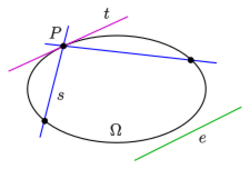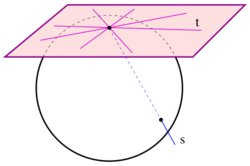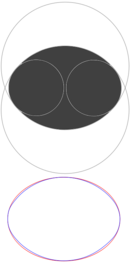Oval
 From HandWiki - Reading time: 4 min
From HandWiki - Reading time: 4 min
An oval (from la ovum 'egg') is a closed curve in a plane which resembles the outline of an egg. The term is not very specific, but in some areas (projective geometry, technical drawing, etc.) it is given a more precise definition, which may include either one or two axes of symmetry of an ellipse. In common English, the term is used in a broader sense: any shape which reminds one of an egg. The three-dimensional version of an oval is called an ovoid.
Oval in geometry

The term oval when used to describe curves in geometry is not well-defined, except in the context of projective geometry. Many distinct curves are commonly called ovals or are said to have an "oval shape". Generally, to be called an oval, a plane curve should resemble the outline of an egg or an ellipse. In particular, these are common traits of ovals:
- they are differentiable (smooth-looking),[1] simple (not self-intersecting), convex, closed, plane curves;
- their shape does not depart much from that of an ellipse, and
- an oval would generally have an axis of symmetry, but this is not required.
Here are examples of ovals described elsewhere:
- Cassini ovals
- portions of some elliptic curves
- Moss's egg
- superellipse
- Cartesian oval
- stadium
An ovoid is the surface in 3-dimensional space generated by rotating an oval curve about one of its axes of symmetry. The adjectives ovoidal and ovate mean having the characteristic of being an ovoid, and are often used as synonyms for "egg-shaped".
Projective geometry


- In a projective plane a set Ω of points is called an oval, if:
- Any line l meets Ω in at most two points, and
- For any point P ∈ Ω there exists exactly one tangent line t through P, i.e., t ∩ Ω = {P}.
For finite planes (i.e. the set of points is finite) there is a more convenient characterization:[2]
- For a finite projective plane of order n (i.e. any line contains n + 1 points) a set Ω of points is an oval if and only if |Ω| = n + 1 and no three points are collinear (on a common line).
An ovoid in a projective space is a set Ω of points such that:
- Any line intersects Ω in at most 2 points,
- The tangents at a point cover a hyperplane (and nothing more), and
- Ω contains no lines.
In the finite case only for dimension 3 there exist ovoids. A convenient characterization is:
- In a 3-dim. finite projective space of order n > 2 any pointset Ω is an ovoid if and only if |Ω| and no three points are collinear.[3]
Egg shape
The shape of an egg is approximated by the "long" half of a prolate spheroid, joined to a "short" half of a roughly spherical ellipsoid, or even a slightly oblate spheroid. These are joined at the equator and share a principal axis of rotational symmetry, as illustrated above. Although the term egg-shaped usually implies a lack of reflection symmetry across the equatorial plane, it may also refer to true prolate ellipsoids. It can also be used to describe the 2-dimensional figure that, if revolved around its major axis, produces the 3-dimensional surface.
Technical drawing

In technical drawing, an oval is a figure that is constructed from two pairs of arcs, with two different radii (see image on the right). The arcs are joined at a point in which lines tangential to both joining arcs lie on the same line, thus making the joint smooth. Any point of an oval belongs to an arc with a constant radius (shorter or longer), but in an ellipse, the radius is continuously changing.
In common speech
In common speech, "oval" means a shape rather like an egg or an ellipse, which may be two-dimensional or three-dimensional. It also often refers to a figure that resembles two semicircles joined by a rectangle, like a cricket infield, speed skating rink or an athletics track. However, this is most correctly called a stadium.


The term "ellipse" is often used interchangeably with oval, despite not being a precise synonym.[4] The term "oblong" is often used incorrectly to describe an elongated oval or 'stadium' shape.[5] However, in geometry, an oblong is a rectangle with unequal adjacent sides (i.e., not a square).[6]
See also
- Ellipse
- Ellipsoidal dome
- Stadium (geometry)
- Vesica piscis – a pointed oval
- Symbolism of domes
Notes
- ↑ If the property makes sense: on a differentiable manifold. In more general settings one might require only a unique tangent line at each point of the curve.
- ↑ Dembowski 1968, p. 147
- ↑ Dembowski 1968, p. 48
- ↑ "Definition of ellipse in US English by Oxford Dictionaries". Oxford University Press. https://en.oxforddictionaries.com/definition/us/ellipse.
- ↑ "Definition of oblong in US English by Oxford Dictionaries". Oxford University Press. https://en.oxforddictionaries.com/definition/us/oblong.
- ↑ "Definition of quadliraterals, Clark University, Dept. of Maths and Computer Science". https://mathcs.clarku.edu/~djoyce/java/elements/bookI/defI22.html.
- Dembowski, Peter (1968), Finite geometries, Ergebnisse der Mathematik und ihrer Grenzgebiete, Band 44, Berlin, New York: Springer-Verlag, ISBN 3-540-61786-8, https://archive.org/details/finitegeometries0000demb
 |
 KSF
KSF